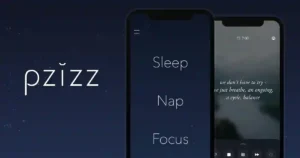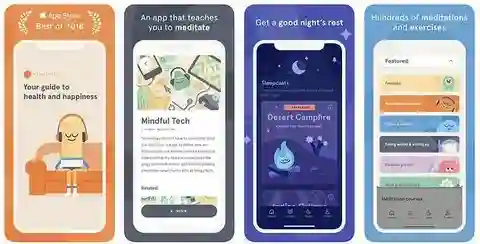Introduction: Why I Turned to Sleep Apps
Let me be honest with you. For years, I struggled to get a good night’s sleep. I’d toss and turn, check the time a hundred times, and wake up feeling like I hadn’t rested at all. I tried everything—counting sheep, reading boring books, even listening to rain sounds on YouTube. But nothing worked long-term.
Then, in late 2024, a friend suggested I try a sleep app. I wasn’t convinced at first. I mean, how could something on my phone help me sleep when the phone itself kept me awake? But I was desperate. So, I gave it a shot—and to my surprise, it changed everything.
Since then, I’ve tested dozens of sleep apps for adults. Some helped, some didn’t. But the ones that worked? They worked like magic. And today, I want to share the best of them with you.
These aren’t just popular apps—they’re the ones that helped me fall asleep faster, stay asleep longer, and wake up feeling human again. If you’re tired of being tired, these are the apps worth trying in 2025.
Calm: The Gold Standard of Sleep Apps
I started with Calm, and honestly, I didn’t expect much. But the moment I heard the gentle voice of a bedtime story in the “Sleep Stories” section, I felt my body relax. It was like someone flipped a switch in my brain. Calm offers guided meditations, relaxing music, sleep sounds, and even breathing exercises. It’s like a peaceful corner of the internet built just for rest.
One night, I listened to a story narrated by Matthew McConaughey. Sounds odd, I know—but his soft, slow voice helped me drift off without even noticing. That became a routine. I’d brush my teeth, get into bed, open Calm, and let it do the rest.
Calm also tracks your mood and helps build better sleep habits over time. It’s not just an app—it feels like a friend helping you wind down every night.
Headspace: A Mindful Way to Sleep
After Calm, I gave Headspace a try. I’d heard a lot about it from people who used it for meditation, but I didn’t realize it had such a strong sleep section, too. One night, I opened the app, picked a “Sleepcast,” and lay back. Within minutes, I felt like I was floating on a cloud. Seriously—it was that relaxing.
What makes Headspace different from other sleep apps for adults is its focus on mindfulness. It doesn’t just help you sleep—it teaches you why your brain keeps racing at night. The narrator talks you through mental exercises that help calm your thoughts, without making you feel like you’re in a therapy session. It feels more like a warm conversation.
There’s a series called “Rainday Antiques” that takes you on a quiet journey through an old shop. The details are so gentle and dreamy that it feels like walking through a memory. This kind of storytelling, mixed with soft background music, makes it easier for the brain to wind down.
And it’s not just about bedtime. If I wake up at 3 a.m., I pop in my earbuds, open Headspace, and I’m back to sleep in 10 minutes. It’s like a reset button for my restless mind.
Pzizz: Weird Name, Wonderful Sleep

When someone first recommended Pzizz, I thought they sneezed. But once I tried it, I understood the hype.
Pzizz uses something called psychoacoustic soundscapes. Sounds fancy, but it means music that speaks to your brain in just the right way to make it feel safe and calm. It’s one of the more science-based sleep apps for adults, and you can tell from the first use.
Each night, Pzizz creates a unique mix of soothing sounds, voiceovers, and melodies. It doesn’t repeat often, which keeps your brain from getting bored. The voice is gentle and hypnotic, and the app even fades out slowly as you fall asleep, like someone quietly closing a door behind you.
I also love the nap feature. If you have trouble falling asleep during the day or need a power nap after lunch, Pzizz gives you the perfect 20-minute sound journey. I’ve used it in my car (parked, of course), during work breaks, and even during travel. It’s like carrying a sleep therapist in your pocket.
BetterSleep (Formerly Relax Melodies): Build-Your-Own Dream World
One night, I stumbled across BetterSleep, and it instantly became one of my favorite sleep apps for adults. Why? Because it lets me create my perfect sound mix.
Want ocean waves, light thunder, and piano music all at once? No problem. Prefer a fan sound with soft humming and forest birds? You can make that too. BetterSleep has dozens of mix-and-match options that let you build your soundscape like a playlist. It’s fun and easy to use—even for someone who isn’t tech-savvy.
But what impressed me was the Sleep Moves section. These are guided bedtime exercises that help you stretch and breathe, preparing your body for sleep. I never realized how tight my shoulders were at night until I followed a few of these gentle movements.
This app is especially helpful for those who are sensitive to certain sounds. Since you control the mix, you get to avoid anything that feels too harsh or distracting. And once you find the perfect combo, you can save it and use it night after night.
Insight Timer: The Underrated Gem
While Calm and Headspace get all the attention, Insight Timer quietly became one of the best sleep apps for adults I’ve used. It’s free, packed with features, and offers thousands of guided meditations, sleep music, and talks by real sleep experts.
I first tried it because I didn’t want to pay for another subscription. To my surprise, Insight Timer had more free content than most paid apps. I found guided meditations by yoga teachers, scientists, and even monks, each with their approach to relaxation.
One of the features I loved most was the community feel. Something is calming about knowing that thousands of other people are listening to the same meditation as you. It feels like a shared bedtime ritual, even if you’re alone in your room.
The app also tracks your sleep habits and gives gentle nudges to help you build a routine. After a few weeks of using it, I found myself going to bed earlier and sleeping longer. It didn’t force me—it just encouraged me in the right direction.
Sleep Cycle: Wake Up at the Right Time
Let’s talk about waking up. You can use the best sleep apps for adults, but if your alarm jolts you awake during deep sleep, you’ll still feel groggy. That’s where Sleep Cycle shines.
Sleep Cycle uses your phone’s microphone or motion sensors to track your sleep patterns. It listens to how much you move, snore, or breathe and figures out what sleep stage you’re in—light, deep, or REM. Then, it wakes you up gently at the lightest point in your cycle, so you feel alert and refreshed.
I remember one morning when my alarm went off, and I woke up smiling. That never happens to me. It turns out Sleep Cycle had found the perfect moment to wake me up, just before I slipped into deep sleep again. Since then, it’s been my go-to morning app.
It also gives you sleep reports, so you can see how well you slept each night. I learned that I tend to sleep better on weekends and not so great after a late dinner. That helped me adjust my routine, and I’ve slept better ever since.
Loóna: For the Overthinkers at Bedtime
If your mind races at night, Loóna might be the app you’ve been looking for. This one’s different. Instead of just playing sounds or telling stories, Loóna combines art, music, and interactive bedtime journeys.
You pick a calming scene—like a quiet cabin or garden—and slowly color it in while the app tells a soft story. The music plays in the background, and the colors move as you touch them. It’s not about being perfect. It’s about slowing your mind down through light activity.
At first, I thought I was too old to “color” on my phone. But the moment I tried it, my thoughts stopped spinning. I wasn’t checking my email. I wasn’t thinking about work. I was just in the moment, relaxing.
Loóna was a surprising discovery. It’s perfect for people whose brains just won’t quit at night. This is one of the most creative sleep apps for adults, and it made a big difference in my bedtime routine.
Smart Alarm Apps: Little Helpers with Big Results
There are also a bunch of smart alarm apps that aren’t full-blown sleep apps, but still work wonders for adult sleep. Alarmy, for example, is famous for making you solve puzzles or take a picture of your bathroom sink to turn off the alarm. Sounds crazy—but it works.
If you’re someone who hits snooze ten times, this might be just what you need. These alarms don’t help you fall asleep, but they help you wake up right, which is just as important. Some of them even let you choose a soft fade-in sound or analyze your sleep through simple tracking tools.
These tools might not be as fancy as Calm or Headspace, but they’re still helpful parts of the larger sleep puzzle. When I pair a sleep tracker with an app like Pzizz or BetterSleep, I get the full experience—from relaxing at night to waking up strong.
FAQs
- Do sleep apps for adults work?
Yes, they do—at least for me and millions of others. These apps use calming sounds, bedtime stories, breathing exercises, and even sleep tracking to help your brain slow down and fall asleep more easily. - Which sleep app is the best for beginners?
If you’re just starting, try Calm or Headspace. They’re simple to use and offer guided help that’s perfect for newcomers. - Are these apps safe to use every night?
Yes, they’re very safe. Most are designed for nightly use and don’t require constant screen time. - Can I use sleep apps without paying?
Absolutely. Insight Timer and BetterSleep offer many features for free. You can try before you buy. - Do I need headphones to use these apps?
Nope. Headphones help, but they’re not required. Just keep the volume low and close your eyes. - Can sleep apps fix serious sleep problems?
If you have severe issues like sleep apnea, talk to a doctor. But for stress-related sleep troubles, these apps help a lot. - Will using my phone at night make my sleep worse?
Usually, yes. But these apps are designed with dark screens and sound-based features, so you don’t need to stare at your phone. - How long does it take to see results?
Some people sleep better the first night. For others, it takes a week or two. Be patient and consistent.
Conclusion: Sleep Isn’t a Luxury—It’s a Lifeline
If you’re anything like I was, sleep feels like a fight you never win. For years, I struggled to fall asleep, and when I finally did, I couldn’t stay asleep. That changed when I discovered the right sleep apps for adults.
Each app taught me something new. Calm helped quiet my thoughts. Headspace showed me how to let go of stress. Pzizz wrapped me in soft, relaxing music. BetterSleep lets me shape my ideal bedtime vibe. Sleep Cycle made mornings feel easier. And Loóna gave my mind a peaceful place to land.
What Sleep Apps Taught Me About Rest
The biggest lesson I learned? Sleep isn’t about forcing rest—it’s about creating space for it. These apps helped me build healthy habits and gave me back the nights I thought I’d lost.
If sleep still feels like a struggle for you, try just one app tonight. Keep it simple. Be kind to yourself. With the right help—even something small—you can finally find the rest you deserve.
Because sleep isn’t just rest. It’s recovery. It’s peace. It’s power.
And you deserve all of it.



